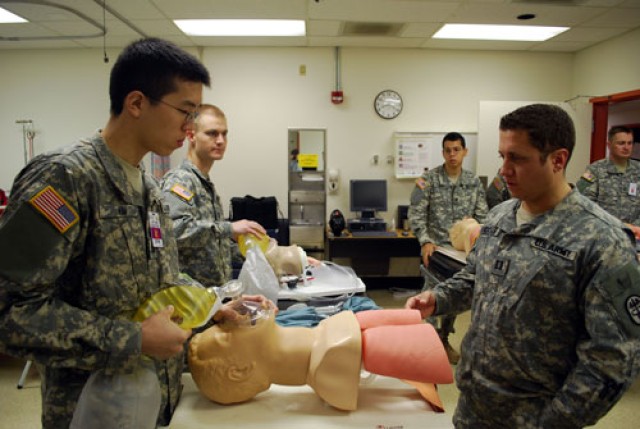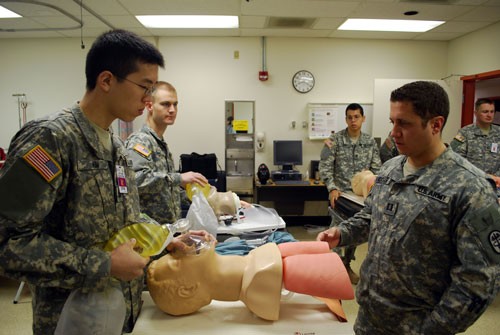
JOINT BASE LEWIS-McChord, Wash. - New medical residents to Madigan Healthcare System descended on Andersen Simulation Center last month to take part in a day-long Advanced Cardiovascular Life Support marathon training course.
The course was condensed from two days into one so the residents could have more trainng time and be ready to provide their medical expertise on Madigan's ward and department floors by July 1, said Cheri Randall, Life Support Programs manager.
All 365 days that first-year residents are studying at Madigan have been pre-planned to ensure they have received all their training, and give them enough clinical time delivering excellent patient care within the hospital, she said.
"We want to give them as much additional training they need before we put them in a room with a patient," Randall said.
"The residents are so grateful for the training we give them."
ACLS training is a mandatory requirement for all residents to meet and one of several different training measurements prior to being released to their respective medical sections.
The course tests the students' ability to perform CPR or unblock a patient's airway, to name a few. They were tested on each skill.
In fact, they spent the morning practicing on the many different ways to manage a patients' airway, and then put their skills to practical use by "running codes" on high-tech simulation mannequins owned by Andersen.
Four or five residents assembled into teams with one taking a leadership role, and he or she had to make an assessment on a mannequin experiencing some kind of medical ailment.
They had to call out to the other residents whatever type of medical support they needed, down to saying the correct name of the medical supplies used in delivering medical aid.
"Students need to ask 'Do I give drugs, cardiovert, continue compressions'' - we try to make it as realistic as possible," Randall said.
Second-year resident Capt. (Dr.) Scott Sanderson did this a year ago when he was a first-year; now, he's an ACLS instructor.
"The ACLS course is a great way to learn how to get the muscle memory we'll need on the floor," Sanderson said.
"These types of courses are critical for the residents to get the crucial training they need before using their skills on real patients."
Capt. (Dr.) Douglas Stoddard said the marathon was much more realistic than he was accustomed to while in medical school.
"You aren't just a doctor in the hospital; all of a sudden, people have expectations of you even if you are a medical student," Stoddard said.
Randall said less-intensive lifesaver classes like Basic Lifesaver Course or Heartsaver Course sponsored by the American Heart Association are available at Madigan each month for those in the military or Department of the Army civilians.

Social Sharing